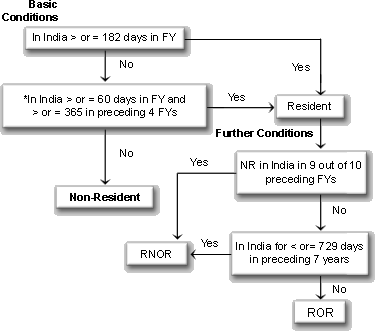For the purposes of levy of tax, the Income-tax Act in India has classified the status of an individual assessee into three viz.,
Resident and ordinarily resident (ROR)
Resident but not ordinarily resident (R but NOR)
Non-resident (NR)
The residential status of an Individual is determined based on the number of days of stay in India. Financial year (FY) is April to March.

*Not applicable to a resident going outside India for employment, a resident who leaves India as a member of crew of an Indian ship, an Indian citizen or person of Indian origin who is abroad and comes to India for a visit i.e. if such a person stays in India for less than 182 days, he would be a non-resident.
In the case of a ROR, his global income is taxed in India. Normally a returning Indian would be assessed as RNOR on his return to India (See FAQs Returning Indians for more).
In the case of a Non-resident, only the income earned or received in India is taxed in India. Accordingly, income earned outside India by 'A' would not be taxable in India.
India has contracted Double Tax Avoidance Agreements (DTAAs) with various countries. Taxability of A's Indian income would be decided as per the provisions of these DTAAs. Most of these DTAAs contain provisions for lower rates of tax in case of incomes like dividend, royalties, fees for technical services etc. Provisions of some DTAAs provide interesting opportunities for efficient tax planning. For instance, the DTAA with Mauritius. Structuring of likely income in India therefore requires a 'case to case' study depending on facts of each case.


